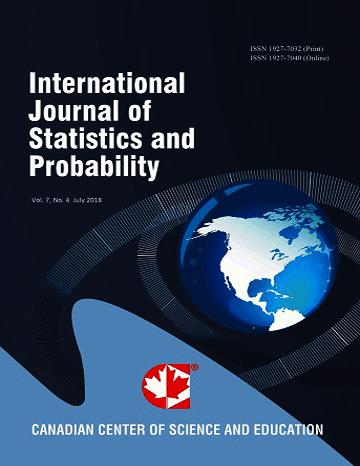Effect of Education on Attitude Towards Domestic Violence in Nigeria: An Exploration Using Propensity Score Methodology
- Olanrewaju Davies Eniade
- Joshua Odunayo Akinyemi
- Oyindamola Bidemi Yusuf
- Rotimi Felix. Afolabi
- Olufunmilayo I. Fawole
Abstract
Propensity Score Methodology (PSM) was used to investigate the effect of education on attitude towards domestic violence (ATDV) among men and women in Nigeria.
A total of 14,495 and 33,419 records were extracted for men and women respectively from the 2016-2017 Multiple Indicator Cluster Survey (MICS) in Nigeria. The outcome variable was ATDV. The study framework described the role of education on ATDV in the light of demographic characteristics, socioeconomic profile, and lifestyle. Selection bias was checked among the levels of education using the multinomial logit regression. Propensity scores (PS) and PS weights were generated for the treatment variable and average treatment effects (ATE) of ATDV were estimated using logistic regression that combined regression adjustment and inverse-probability weight. Descriptive statistics, odds ratios and 95%CI were presented.
The mean age of men and women were 30.8±10.2 years and 29±9.4 years respectively. About 22% men and 35% women justified domestic violence (DV) respectively. Selection bias was found between the covariates and level of education (p<0.05). PSM effectively corrected the selection bias (SD diff ≈ 0, Variance ratio ≈ 1). Men (AOR = 0.84, 95% CI: 0.78, 0.92) and women (AOR=0.94, 95%CI: 0.80, 2.22) who have attained tertiary level of education were less likely to justify DV in comparison to their uneducated counterparts.
Tertiary education was protective for ATDV among men and women. The use of PSM effectively controlled for selection bias in estimating the effect of education on ATDV. PSM will enable researchers make causal inference from non-experimental/cross-sectional studies in situations where randomized control trials are not feasible.
- Full Text:
 PDF
PDF
- DOI:10.5539/ijsp.v10n3p154
Index
- ACNP
- Aerospace Database
- BASE (Bielefeld Academic Search Engine)
- CNKI Scholar
- DTU Library
- Elektronische Zeitschriftenbibliothek (EZB)
- EuroPub Database
- Excellence in Research for Australia (ERA)
- Google Scholar
- Harvard Library
- Infotrieve
- JournalTOCs
- Mir@bel
- Open policy finder
- ResearchGate
- Technische Informationsbibliothek (TIB)
- UCR Library
- WorldCat
Contact
- Wendy SmithEditorial Assistant
- ijsp@ccsenet.org
